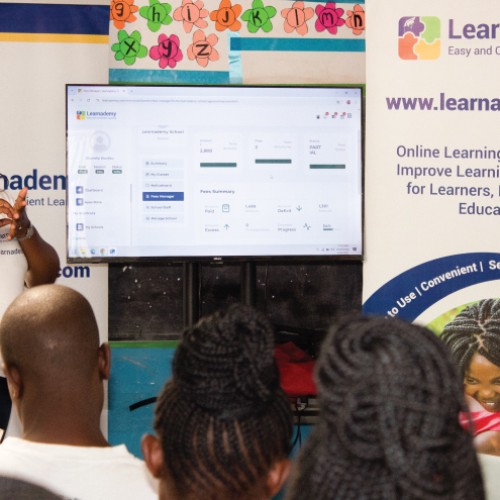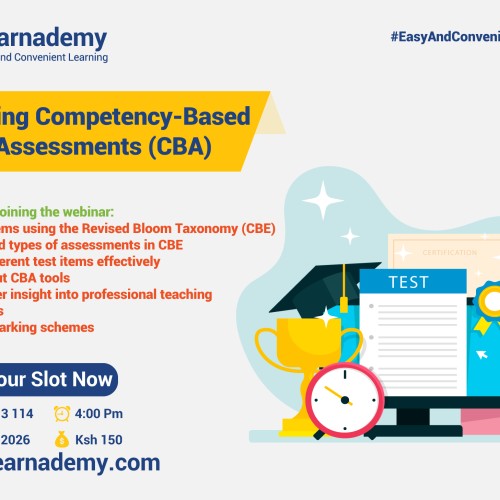-
Back
- Blog
- Browse Blogs
- Blog Post
- Get In Touch
-
Explore
- Sign up
- Login
Blog Inquiry

Transforming Classrooms: Why CBE Training Matters for Kenyan Educators
29 Aug 2025 SocialAs Kenya shifts toward Competency-Based Education (CBE), schools and educators must rethink how learning happens. The focus is moving away from cramming and rote memorization toward nurturing skills and competencies that prepare learners for real-world success. But this shift raises an important question: how can teachers adapt and deliver on these new expectations? The answer lies in structured, intentional, and flexible teacher training and professional development programs that empower educators to thrive in this evolving landscape.
Reforms in the Kenyan education sector require more than policy changes; they necessitate a fundamental shift in how teachers deliver learning. One particularly impactful approach is engaging in CBE-focused teacher training programs that provide practical tools and guidance for implementing competency-based lessons effectively. These programs equip teachers with modern pedagogical strategies, ensuring they can create modern classrooms where students actively participate, collaborate, and demonstrate mastery of skills. Educators who engage in professional development gain confidence, enabling them to navigate the CBE landscape successfully and prepare learners for real-world challenges.
From CBC to CBE: A Shift in Focus
While the Competency-Based Curriculum (CBC) laid the groundwork for skills-based learning, CBE emphasizes mastery and real-world application. CBC introduced continuous assessments and learner-centred approaches, but CBE ensures students demonstrate competencies before progressing. Teachers must move beyond content delivery to facilitate understanding and skill application. Traditional test-based methods are no longer sufficient; students must actively apply what they’ve learned through projects, presentations, and other authentic assessments.
To translate these expectations into meaningful classroom practice, teachers need professional development that equips them with strategies for personalized instruction and effective learner engagement. Teacher training in CBE equips educators with strategies to incorporate these methods effectively, ensuring students develop critical thinking, problem-solving, and collaboration skills.
CBE focuses on personalized instruction, enabling teachers to identify and address each learner’s gaps. Authentic assessments—such as projects, presentations, and real-life tasks—replace reliance on written exams, while flexible pacing allows students to progress only when mastery is achieved. Without proper teacher retooling, even the most robust curriculum falls short. Professional development programs provide educators with practical strategies to implement CBE successfully. They also emphasize the integration of education technology to enhance lesson delivery, monitor student progress, and create interactive learning experiences.
The Government’s Role in Advancing CBE Teacher Training
The Ministry of Education and the Teachers Service Commission (TSC) have issued directives requiring teacher retraining and formed partnerships to develop teacher training materials. They also organize workshops and seminars to support educators. However, with over 300,000 teachers nationwide, many cannot attend in-person sessions—especially in remote areas. Online training programs provide a scalable solution, allowing teachers to access professional development opportunities anytime, anywhere. By integrating education technology, teachers in both urban and rural settings can engage in continuous learning, improving learner engagement and classroom outcomes.
Why Online Training is a Game-Changer for Kenyan Teachers
Distance, cost, and time constraints make traditional workshops challenging, particularly for rural educators. Online training addresses these challenges, offering flexible schedules and mobile-friendly access. Teachers can revisit course materials, practice new techniques, and track their progress independently. This flexibility enhances professional growth and allows educators to integrate best practices into their classrooms at a manageable pace. Incorporating education technology and interactive tools ensures that professional development translates directly into improvements in learner engagement and mastery of competencies.
Why Teacher Retooling is Non-Negotiable for CBE Success
CBE is more than a policy—it’s a new approach to teaching. Teachers who embrace professional development and teacher retooling see deeper student engagement, more creativity in lessons, and improved learning outcomes. Students demonstrate mastery before moving on, building a strong foundation for future education. Schools and parents increasingly demand CBE-aligned educators. Investing in teacher training now future-proofs careers, increases value in the job market, and boosts confidence in delivering 21st-century education. Well-trained teachers are central to Kenya’s education transformation.
Flexible online training and targeted professional development programs make continuous growth possible for educators across the country. While the government provides essential support, the private sector and specialized organizations also play a critical role in advancing CBE teacher training. Platforms and initiatives, including Learnademy, help make professional development more accessible, providing resources and tools that enable teachers to implement CBE effectively and confidently, ultimately enhancing learner engagement and creating modern classrooms where every student can thrive.








